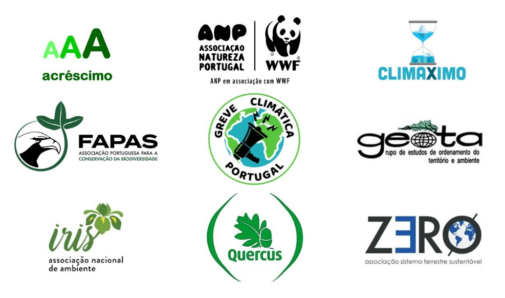Más de 60 grupos publican una carta abierta en oposición a una conversión de carbón a biomasa en Portugal

Nueve ONG medioambientales portuguesas (incluidos dos grupos miembro de la Coalición Mundial por los Bosques), con la solidaridad de otras 58 organizaciones a nivel internacional, han publicado una carta abierta (ver más abajo) al gobierno portugués y a la Comisión Europea exigiendo que no utilicen fondos públicos para financiar una conversión de la quema de carbón a la quema de biomasa en la central eléctrica de Pego.
Continuar leyendo en inglés…
Pego’s coal-burning unit is due to close in November this year, but its main shareholder, Trustenergy, is proposing an almost one billion Euro investment centred around converting from coal to burning wood pellets. As well as having massive implications for forests, communities and the climate because of the huge new demand for wood that this would create, the plan would also rely on finance from the EU’s Just Transition Fund (JTF). The JTF is designed to support coal-dependent communities as the fossil fuel is phased-out, but this would be a test case for using it to finance a false climate solution instead of a genuinely just and renewable transition to low-carbon electricity generation.
You can support the campaign online by using our social media toolkit (in English and Portuguese) where you will find photos, sample tweets and more. You can also read our press release and help us to spread the word to your own press contacts.
Open letter against the Pego power station coal-to-biomass conversion
Leia a carta aberta em português aqui
To: The Portuguese Government and the European Commission
At a time when the impacts of biomass burning on ecosystems, communities and the climate are increasingly clear, the main shareholder of the 628MW Pego power station in Portugal, Trustenergy, has announced its intention to convert the power station’s coal burning unit (due to close in November 2021) to burning forest “residues”. In practice, this would undoubtedly translate into burning trees.
Under recent operating conditions a conversion would require 1.1 million tonnes of green wood annually [1]. However, with the plant operating at full capacity, Pego would need closer to 5 million tonnes of wood [2]. In either case, the increased demand for raw material would far exceed available resources [3].
Although Trustenergy (a joint venture between ENGIE and Marubeni) claims that only forest “residues” would be burned at Pego, the fact is that under current EU rules this term can include any type of wood, whether waste from industrial operations or whole trees. On top of this, burning residual forest biomass to generate electricity [4] is hugely inefficient and involves considerable cost in terms of its extraction, transport and storage, and the operation of the plant’s equipment. Because of this, what is found in the storage yards of most biomass power stations and wood pellet factories in Portugal is not “residues”, but sections of tree trunk (roundwood).
If converted, one of the most likely feedstocks for Pego would be eucalyptus logs, which would increase demand for it in direct competition with a number of near-by pulp and paper mills [5]. This would likely lead to the expansion of eucalyptus monocultures in the Tagus river watershed, which could in turn aggravate Portugal’s problems with large fires. It would also require Portugal to import more eucalyptus from countries such as Spain, Uruguay or Mozambique, which will begin exports this year.
The other likely option would be burning wood pellets produced from pine trees, using existing production capacity [6], and which would contribute to an even greater imbalance in the already unsustainable harvest rate of pine in Portugal. This second option would certainly also lead to large quantities of pellets being imported from countries such as the United States and Canada, which already produce pellets for electricity generation elsewhere in Europe, and which has major impacts on forests there.
Any increase in the industrial burning of trees in Portugal will immediately contribute to an increased loss of tree cover, particularly of native pines, which are already in sharp decline in the country [7]. The impacts of biomass burning for electricity generation in Portugal are already devastating in terms of loss of soil quality, water storage capacity and the maintenance of biodiversity [8]. Also, rather than being carbon neutral, switching to burning biomass at Pego would increase carbon in the atmosphere since the emissions associated with it can be much worse than the fossil fuels it replaces [9].
Converting Pego will require strong public subsidy and an increased financial burden on electricity consumers. Trustenergy has indicated that it will seek public support for burning trees to produce electricity through the Just Transition Fund and Recovery and Resilience Plan. Whilst this may serve the speculative interests of the company, it could never be just or guarantee economic recovery, and it would certainly not increase Portugal’s resilience to the threats of climate change and the collapse of biodiversity.
It is however important to allocate public funding to support retraining and the creation of new jobs in the region, prioritising truly renewable energy sources, and to compensate for any job losses associated with the closure of the coal plant at Pego. It is also key to direct public subsidy towards supporting rural landowners, to help them conserve habitats and encourage truly sustainable management practices.
For these reasons, the undersigned organisations appeal to the Portuguese Government and the European Commission not to use public funds to finance a coal-to-biomass conversion at Pego power station.
Signatories in Portugal (9):
International signatories (58):
Amis de l’Afrique Francophone – Bénin (AMAF-BENIN), Bénin; ARA, Germany; BankTrack, International; Biofuelwatch, UK/U.S.; Coal Action Network, UK; CENSAT Agua Viva – Amigos de la Tierra Colombia, Colombia; Centre for Environmental Justice, Sri Lanka; Climate Reality Europe, International; Coastal Plain Conservation Group, U.S.; Comité Schone Lucht, Netherlands; De Woudreus, Netherlands; Deutsche Umwelthilfe e.V. (DUH), Germany; Dogwood Alliance, U.S.; Duurzaam Dorp Diemen, Netherlands; Earth Thrive, UK/Balkans; EKOenergy ecolabel, International; Federação de Órgãos para Assistência Social e Educacional (FASE), Brazil; Federation of Community Forestry Users Nepal (FECOFUN), Nepal; Fern, Belgium; Forests of the World, Denmark; Forests, Climate and Biomass Working Group, Environmental Paper Network, International; Forum Ökologie & Papier, Germany; Friends of Fertő Lake, Hungary; Friends of Siberian Forests, Russia; Friends of the Earth/BUND, Germany; Front Commun pour la Protection de l’Environnement et des Espaces Protégés (FCPEEP), DR Congo; GE Free NZ in Food and Environment, Aotearoa/NZ; GeaSphere, South Africa; Global Forest Coalition, International; Global Justice Ecology Project, U.S./ International; Healthy Forest Coalition N.S., Canada; Justica Ambiental – JA! Friends of the Earth Mozambique, Mozambique; Landelijk Netwerk Bossen- en Bomenbescherming, Netherlands; Leefmilieu, Netherlands; Les Amis de la Terre Togo, Togo; Mighty Earth, International; Miljøbevægelsen NOAH Friends of the Earth Denmark, Denmark; Mobilisation for the Environment, Netherlands; Mom Lobes Taiwan Association, Taiwan; Nature Nova Scotia, Canada, NRDC (Natural Resources Defense Council), U.S.; Päästame Eesti Metsad (Save Estonia’s Forests), Estonia; Partnership for Policy Integrity, U.S.; Pivot Point, U.S.; Protect the Forest, Sweden; Reclaim Finance, France; Rettet den Regenwald e.V., Germany; ROBIN WOOD, Germany; Salva la Selva, Spain; SEE Change Net, S.E. Europe; Southern Environmental Law Center, U.S.; Spruill Farm Conservation Project, U.S.; The Climate Reality Project, Brazil; Urgewald, Germany; Water Justice and Gender, Netherlands; Wild Europe, International; Workshop for All Beings, Poland; YUVA, Turkey.
Notes:
[1] As described in “Avaliação do ciclo de vida da geração de eletricidade numa central termoelétrica a carvão convertida para biomassa florestal” (Life cycle assessment of electricity generation in a coal-fired power plant converted to forest biomass) by Tobias de Jesus Prudêncio Pereira (University of Coimbra, 2019).
[2] Equivalent to around 2.6 million tonnes of pellets, assuming 8,000 hours of operation per year and an efficiency of 38%.
[3] According to a 2013 report prepared by the Portuguese Parliament, the potential annual availability of residual biomass in Portugal is 2.2 million tonnes, a value that deserves special attention in order to ensure that biomass isn’t over-exploited. The consumption of residual forest biomass for producing energy and wood pellets in 2013 was already estimated to be over 3 million tonnes per year. Despite this, in 2016 and 2017 alone new licences were granted to 8 thermoelectric biomass power plants with a combined capacity of more than 150 megawatts, the equivalent of a biomass requirement of close to 2 million tonnes per year. In other words, biomass resources have become increasingly over-exploited.
[4] The “residues” produced by forestry operations aren’t waste, but organic material that can have various uses. Most importantly, these leftovers are vital to soil health and an excellent organic fertilizer, especially after being chipped. This should be their primary use in a country with soils that are mostly poor in organic matter. Another more appropriate use, on a strictly local level, is for heat production domestically or in the agricultural sector.
[5] The region where Pego is located already has pulp and paper mills (Constância and Vila Velha de Ródão), a number of sawmills (Sertã and Oleiros), as well as an electricity-only biomass power station (Fundão) and a number of wood pellet factories (Sertã, Oleiros and Proença-a-Nova). A biomass conversion at Pego would therefore drastically increase demand for wood in the region and put even more pressure on the region’s wooded areas.
[6] According to an international study, Portugal is the fourth largest supplier of wood pellets to the converted Drax power station in the United Kingdom, which has an installed capacity of 4,000 megawatts.
[7] According to data from the World Bank, Portugal’s forest cover decreased from 37.15% in 1990 to 36.16% in 2018, with a slight recovery between 2010 and 2015 of 0.65%.
[8] According to a recent OECD report, Portugal had the fourth largest relative loss of natural and semi-natural areas recorded between 1992 and 2018 of any EU member country.
[9] See “Letter Regarding Use of Forests for Bioenergy”, February 11, 2021.











